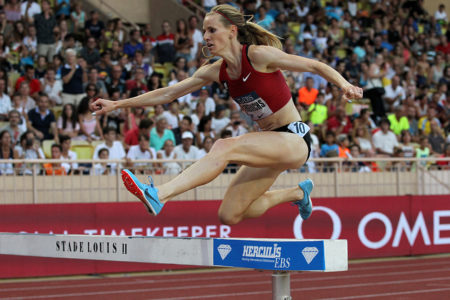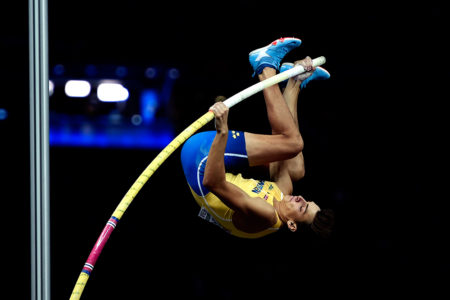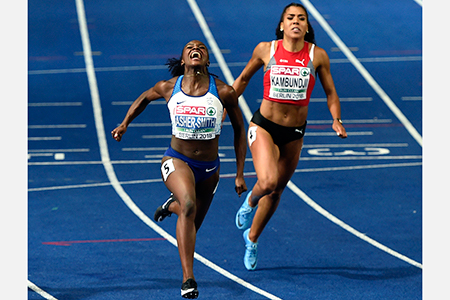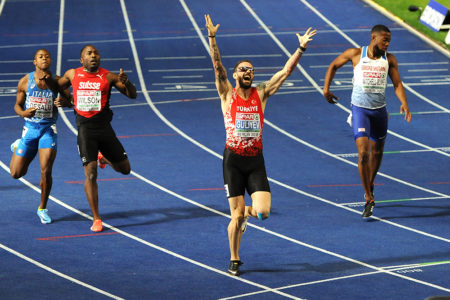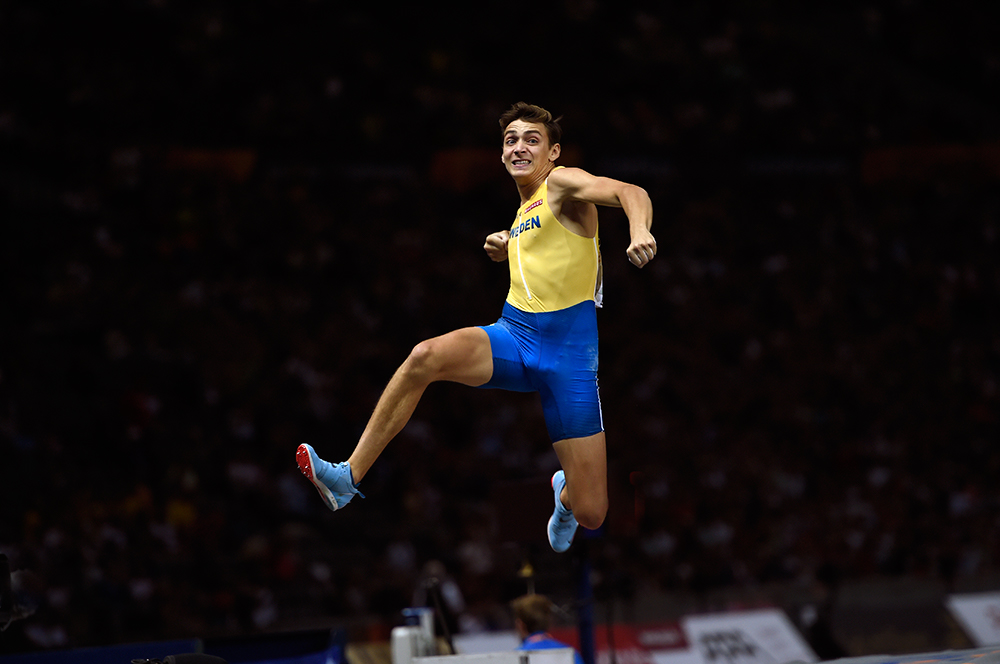
Berlin, Germany; August 12—Perhaps it’s easiest just to lay out the series of the pole vault winner: 17-4½ (5.30), pass; 18-½ (5.50), make; 18-6½ (5.65), make; 18-10¼ (5.75), pass; 19-¼ (5.80), miss/make; 19-2¼ (5.85), make; 19-4¼ (5.90), make; 19-6¼ (5.95) World Junior Record, make; 19-8¼ (6.00) World Junior Record, make; 19-10¼ (6.05) World Junior Record, make; 20-0 (6.10), pass.
But those cold hard numbers—claimed by Mondo Duplantis, of course—don’t tell the story of just how spectacular he looked as the European Championships came to a rousing finish. Other than that anomalous single miss at 19-¼ (5.80) he didn’t touch the crossbar all day. Just trip after trip down the runway, soaring high over the bar despite the intense pressure and not always being in the lead.
When the bar rose to 19-2¼ (5.85), perfect records found Pole Piotr Lisek in the lead, with Duplantis 2nd and WR holder Renaud Lavillenie only 7th after a pass at 18-10¼ (5.75) and a pair of misses at 19-¼ (5.80). At 19-2¼ (5.85), young Russian Timur Morgunov, who had passed 19-¼ (5.80), assumed the lead by remaining perfect on the day. Duplantis kept pace and Lavillenie clawed his way back into the game with a make on his only available try.
The next setting, 19-4¼ (5.90), found 5 vaulters still in the game. Lisek promptly cleared to briefly take the lead, but the top spot quickly moved to Duplantis and then back to Morgunov as they were also successful. Lavillenie and second Pole Paweł Wojciechowski passed.
So there were still 5 at 19-6¼ (5.95): Lisek missed, but Duplantis went over to reclaim the lead, and he kept it when Morgunov—jumping at a PR height—incurred his first failure of the day. Lavillenie vaulted into 2nd with a make and Wojciechowski missed. With the chess match getting serious, Lisek and Morgunov both elected to pass to the next height. For Duplantis, the clearance added 2cm to his own World Junior & High School Records.
And then there were 4, vaulting at the event’s big barrier, 6.00 (19-8¼). Lavillenie and Lisek had previously conquered that setting, but the latter on only one occasions. It was new territory for the two youngsters. Lisek kicked things off with a miss. Duplantis stayed in his groove, soaring over for another WJR. That earned him a bear hug from Wojciechowski, with the group expanding to 4 as Lisek and Lavillenie joined in the celebration. Those vaulters are indeed a close-knit bunch. But Duplantis quickly had company as the 21-year-old Morgunov joined the 6-meter club. Lavillenie missed. Lisek missed a second time and he was out. Lavillenie passed.
With the bar at 19-10¼ (6.05), surely the ceaseless clearance of bars had to end, right? With Lisek gone, Duplantis now assumed the icebreaking role. Wham! Another clean clearance and the Swedish-American claimed a share of No. 4 on the all-time world list. That earned him another hug from his good buddy Lavillenie. The rest was anticlimactic, as neither Lavillenie or Morgunov could match Duplantis. A long competition finally settled, Duplantis elected to pass the next height, the big English barrier of 20-0 (6.10).
“I don’t think that there are any words in this world to describe what I feel,” said Duplantis, who is about to start his frosh-year classes at LSU. “I am on the top of the world. I am so happy; it could not be any better. After I jumped 6m, I just knew I needed to go higher. It was crazy and pretty tough for me. I had to switch poles at the higher heights for ones I have never used before in competition.”
Said Morgunov, who became only the fifth man ever to jump 6m and lose, “I really did not expect such results at all. I just competed with the others and tried to do technically good jumps. I have no idea what happened there and why it was such a crazy amazing competition.”
As for Lavillenie, who equaled the highest 3rd-place jump ever, he said, “Before coming here I said that the competition was going to be an intense battle—and it was. We have to enjoy it. This was one of the most epic competitions ever. I know why I love to be at championships. Today it was like in poker: ‘all in.’ It is a kind of a risk, but if you do not do it, you cannot win. It was an emotional day. I have to be honest, I had a lot of trouble with my knee; it was difficult for me to be without pain. The pole was not moving as I expected, so I jumped with a smaller pole.”
One final stat note: under current USATF rules, as a U.S. citizen Duplantis is eligible for American Records, even though he represents Sweden internationally and is not carried on U.S. lists.
Meanwhile, At Ground Level…
In a meet with a timetable full of quirks, the middle of the final session was turned over to a trio of longer women’s races, sequentially the 1500, 5000 and steeple. The reigning Euro Indoor 1500 titlist—with a pair of World Indoor medals (1500 silver and 3000 bronze) added to her collection in March—Laura Muir came into the metric mile as the favorite and took the win with a mid-race surge and strength to the end. After the 25-year-old Briton’s teammate Laura Weightman covered the first lap at the front in 69.54, Muir, coached by Steve Cram, moved to the lead on the second circuit and powered through the third lap with a 61.89 split that strung out the field and set the favorite 5m clear of Weightman at the bell with another 10m back to Pole Sofia Ennaoui.
As Muir knocked out the first half of her final lap in 30.56, Weightman’s tempo began to waiver. Ennaoui and Ireland’s Ciara Mageean closed the gap to Weightman on the backstretch and reached her shoulder exiting the last turn. Muir cruised away free and clear to win in 4:02.32 for her first major outdoor crown. Ennaoui closed well down the straight to take 2nd in 4:03.08 more than 3m ahead of Weightman, who gritted her teeth, repulsed Mageean’s attempt to pass and earned the bronze with 4:03.75. She had also placed 3rd in ’14. For the 22-year-old Ennaoui, the silver represented an upgrade from the bronze she won at the Euro Indoor last year.
Said Muir, who had covered the last 400 in 63.12 and last 2 laps in 2:05.31, “I’m really, really happy with this gold medal. I knew the pressure was on, and I’m really glad Laura Weightman was right behind me, so both of us could be on the podium.”
Sifan Hassan eschewed the 1500 for the 5000 and made the longer distance look easy. The prohibitive favorite after her 14:22.34 European Record in Rabat, the Dutchwoman stayed in the back while Eilish McColgan of Britain led for most of the first 6 laps, guiding the pack through kilos of 3:03.01 and 2:58.61. Turkey’s Yasemin Can took over as the lead pack went down to 5: Can, McColgan, 10,000 champ Lonah Salpeter, Germany’s Konstanze Klosterhalfen and Hassan. Can maintained the pace with a third kilometer of 3:00.97 (8:59.58).
After a 3:03.02 fourth kilo, Hassan took over, streaking to the front. The pack stayed with her as she increased the tempo through 200s of 35.73, 34.54 and 31.31. With 600 to go, Salpeter challenged, sprinting hard. Hassan responded and the two floated away from the others. With 400 to go, Salpeter, on Hassan’s shoulder, stopped, thinking she had won silver. Somewhat confused, Hassan launched into her actual kick, covering the final lap in 60.65 to score gold in a meet record 14:46.12. Behind her, Salpeter, once she started running again, was immediately passed by a hard-charging McColgan, who held on for silver in 14:52.83. Can moved past Salpeter into the bronze position with 200 left, finishing in 14:57.63. The Israeli, crushed by her mistake, earned a short-term national record 15:01.00 in 4th before finding out she had been disqualified for a lane violation on the initial lane break after the start.
Said Hassan, “My plan was to go in front on the last 800m for the final sprint. I did what my coach told me. On the last lap I saw Salpeter, I thought she wanted to do a longer sprint, I thought that she wanted to pick up the pace. And when she stopped, I thought, ‘Am I right? What is she doing? What should I do?’ I heard the people shout. It was crazy. And then I realized that I was right and continued my race for the final lap.”
In the steeple Fabienne Schlumpf of Switzerland did the lion’s share of the leading, through the first kilo in 3:05.79 and 2000 in 6:16.32 after taking up the tempo from early leader Maruša Mišmaš of Slovenia. At the end, though, it was 26-year-old home favorite Gesa Felicitas-Krause who defended her title from ’16. As Schlumpf tried her best to get away in the closing laps, Felicitas-Krause stuck right behind, at 5-5¾ (1.67) her head topping out around the 6-foot (1.83) Schlumpf’s shoulders. On the run-in to the final water jump, Felicitas-Krause injected a sharp acceleration to pass her Swiss rival before the barrier, splashed into the water a meter in front and sprinted away to a 15m lead at the end. Felicitas-Krause’s 9:19.80 winner was her season’s best as was the 9:22.29 for Schlumpf. Norwegian Karoline Bjerkeli-Grøvdal took bronze in 9:24.46 ahead of ’16 silver medalist Gega Luiza of Albania (9:24.78). “I am happy that my tactics worked,” said the winner. “I still had some power left on the last lap. The time is secondary; I am happy that it is sub-9:30.”
Nelson Évora came to the meet with a medal chest that contained just about everything one could want, including World (’07) and Olympic (’08) golds from a decade ago. But at 34, the Portuguese vet was still missing something significant. Even though he had a pair of Euro Indoor golds, he had never scored outside. Until now. “This is perfect! I have been longing for this European title for a while, and, today, I finally did it,” he said after his fifth-round comethrough, raising his seasonal best to 56-1½ (17.10) to pass leader Alexis Copello. “Age doesn’t really matter,” the winner explained. “The most important is to have high expectations and aspirations so I can do well. I’m still growing as an athlete, and I can jump better than this.”
Anita Włodarczyk was brutally honest after winning the hammer for the fourth time, explaining, “I have so many medals that it is hard for me to find the right motivation at every competition. But I want to win and I was also aiming for 80m.” The Polish WR holder was nowhere near 80 (262-5) on her lackluster first throw, reaching a mere 227-6 (69.35). Meanwhile, Alexandra Tavernier had made things interesting by upping the French Record to 245-4 (74.78) to take the lead. “My aim was to get out a great throw on the first attempt and it worked,” she said. It didn’t work for long, of course, because Włodarczyk responded with a 251-0 (76.50), improved that to 255-4 (77.82) in round 3 and a meet record 259-0 (78.94) in the fourth stanza before finishing off with 257-8 (78.55) and a foul. Tavernier’s mark did hold up for silver.
A Hat Trick For Asher-Smith
The Dina Asher-Smith show continued in the 4 x 100, with the double sprint winner sealing her claim as the woman of the championships. In the heats, Britain led with the fastest time, 42.19, though the Germans won the second heat with a 42.34 despite a horrible final changeover. Also looking like threats were the Dutch (42.62) and the Swiss (42.62). In the final, Dafne Schippers got the Dutch out to a sizeable lead in lane 4 on the first leg, leaving British leadoff Asha Phillip considerably behind in lane 3. Germany’s Gina Lückenkemper powered the backstretch, moving into the lead on the handoff, as Britain’s Imani Lansiquot pulled closer. On the turn, the Germans were joined by the Swiss, the Dutch and the British. By the final exchange, the Swiss appeared to be in the lead alongside the Netherlands, with the Germans a smidge behind—and the British two smidges back.
Cue Asher-Smith. The 22-year-old phenomenon took the baton from Bianca Williams and ran as if on fire, reeling in the Swiss anchor, Salomé Kora, first, then the German anchor Rebekka Haase. With 50m left she nailed the Netherlands’ Naomi Sedney and when she hit the finish in a world-leading 41.88 she led by 2m. The Dutch scored silver in 42.15 and the Germans bronze (42.23).
“I’m just so honestly proud,” said Asher-Smith of winning her third gold of the meet, all in WL time. “It was something that I was aiming for and you never know if it’s possible and you never know how relays are going to go. I’m so grateful for all these girls for putting out their best for our country and coming home with gold.” Not since Katrin Krabbe in ’90 had this sprint triple been accomplished.
The men’s 4×1 brought the meet to a close as 2-time defending champion Great Britain projected as the odds-on favorite. The Brit baton men also won gold at last summer’s World Championships and had zipped a season leading 37.61 at the London DL 3 weeks ago. The crew of CJ Ujah, Zharnel Hughes, Adam Gemili and Nethaneel Mitchell-Blake led qualifying in 37.84.
The plot thickened, though, when the favorites took the track for the final and Mitchell-Blake was nowhere to be seen, having been replaced on anchor by 29-year-old Harry Aikines-Aryeetey. “HAA,” while a veteran of the British ’14 gold medal squad and the unit that placed 5th at Rio, this year had not shown the kind of form that carried Mitchell-Blake to 200 silver in these championships (20.04). In lane 5, Ujah carried the stick out well, but in lane 8 Turkey’s Emre Zafer Barnes was also moving fast. Zharnel Hughes took the baton and turned the backstraight with speed befitting his status as 100 champion for the lead.
Hughes’ turnover to Gemili was efficiently swift and the ’14 200 champion maintained his squad’s margin over Turkey and the Netherlands (lane 7) around the bend. Aikines-Aryeetey took the stick well before Turkey’s Yiǧitcan Hekimoglu passed to this year’s 200 champ Ramil Guliyev and the completion of the Netherlands pass (Hensley Paulina to Taymir Burnet). Guliyev scorched the straight racing past Burnet some 20m from the line but HAA crossed a meter-and-a-half in front for a 37.80–37.98 win. Turkey’s silver time was a national record. It was a 3-team race, as the Netherlands in 3rd at 38.03, also an NR, enjoyed almost a half-second margin over France (38.51).
The Brit foursome all offered praise for their collaborative effort. Ujah: “I always like to kick things off, and it’s been a pleasure to run with these guys. One word to define us would be strength.” Hughes: “It’s been really exciting to be here, I’m very happy to be able to run with this group after the 100. It’s been a busy week for me.” Gemilli: “It’s an amazing way to end these championships, especially for some of us who are not happy with our individual results. This is really fantastic. If I have to use a word to define us, maybe I’d say unity or versatility.” Aikines-Aryeetey’s comments suggested his substitution for Mitchell-Blake was planned all along. “I’m the old dog in the group,” he said, “so I didn’t have to run the semi-final. I won my first international medal right here, in this stadium, 9 years ago [at the World Championships], so this has been a great experience today.”
The meet’s final day began downtown with the staging of the marathons. For the women, the 26-miler was more a grind than any complicated tactical battle. Belarus’s Volha Mazuronak, who had placed 5th in Rio, directed the lead pack from the start, despite dealing with a gory-looking nosebleed that hit a half-hour into the race. By halfway (1:14:00), 10 remained in the pack. By 30K, that number had dwindled to 4: Mazuronak and her teammate, Maryna Damantsevich, France’s Clémence Calvin, and Czech Eva Vrabcová-Nývltová. The pace had remained steady through 10K segments of 35:12, 34:58, 34:25 and 34:28. But Damantsevich had hit the wall after 30K—all that remained was to sort out the order of the medals. With 2K to go, the 3 survivors remained together.
However, Mazuronak, 29, showed her remaining strength, building an impressive lead—and then losing it all less than a mile from the finish by taking a wrong turn that allowed Calvin to catch up. She recovered magnificently, mounting a powerful kick to win by 6 seconds, 2:26:22–2:26:28. Vrabcová-Nývltová (2:26:31) grabbed 3rd. With the medalists all within a 9-second window, this was the closest race in Euros history. In the team competition, Belarus (1-4-5) handily topped Italy (6-8-14) and Spain (9-13-23).
For Naert Koen, a big breakthrough could not have come at a better time. The 28-year-old Belgian had moved up to the marathon in ’15 and had never placed higher in a race than 7th. With a best of 2:10:16 from ’17, he was ranked only No. 9 among the starters. However, today would be the day he made all the right moves. Just after 30K, he made a decisive surge away from the pack and went unchallenged to the finish line, crossing in a meet record 2:09:51, breaking Martín Fiz’s 2:10:31 mark from 24 years ago. Switzerland’s Tadesse Abraham—who won the half-marathon at the ’16 Euros—closed well to grab silver in 2:11:24 (on his birthday, no less), while Italy’s Yassine Rachik got to the bronze in 2:12:09, clear of the fast-closing Javier Guerra of Spain (2:12:22). Italy (3-5-12) won the team race over Spain (4-6-16) and Austria (8-10-41).
Said Koen—who works full-time as a nurse—”This is incredible! Coming out here and do this time, it hasn’t really sunk in. I was really nervous before, and during the race, but I knew I had to be very patient. So, I waited until the right moment to move away from the group, and get the lead position. I was feeling particularly strong today, but equally apprehensive. I guess I simply turned all that stress into power and confidence throughout the race. It’s really difficult to believe this has happened. I knew I could get a medal, but never expected it to be the gold one.”
Sunday’s Medal Winners
Men’s Marathon
Naert Koen (Belgium), Abraham Tadesse (Switzerland), Rachik Yassine (Italy)
4 x 100
Great Britain, Turkey, Netherlands
Pole Vault
Mondo Duplantis (Sweden), Timur Morgunov (Russia), Renaud Lavillenie (France)
Triple Jump
Nelson Évora (Portugal), Alexis Copello (Azerbaijan), Dimítrios Tsiámis (Greece)
High Jump
Mateusz Przybylko (Germany), Maksim Nedasekau (Belarus), Ilya Ivanyuk (Russia)
Women’s 1500
Laura Muir (Great Britain), Sofia Ennaoui (Poland), Laura Weightman (Great Britain)
Steeple
Gesa-Felicitas Krause (Germany), Fabienne Schlumpf (Switzerland), Karoline Bjerkeli Grøvdal (Norway)
5000
Sifan Hassan (Netherlands), Eilish McColgan (Great Britain), Yasemin Can (Turkey)
Marathon
Volha Mazuronak (Belarus), Clémence Calvin (France), Eva Vrabcová-Nýltová (Czech Republic)
4 x 100
Great Britain, Netherlands, Germany
Hammer
Anita Włodarczyk (Poland), Alexandra Tavernier (France), Johanna Fiodorow (Poland)
Links to Euro Champs results: Men — Women
The complete list of medal winners can be found here. □
